Monika Maron | |
|---|---|
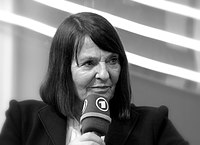 Monika Maron (2018) | |
| Born | 3 June 1941 Berlin |
| Occupation | author |
| Nationality | German |
Monika Maron (born 3 June 1941 in Berlin) is a German author, formerly of the German Democratic Republic. [1]
Monika Maron | |
|---|---|
 Monika Maron (2018) | |
| Born | 3 June 1941 Berlin |
| Occupation | author |
| Nationality | German |
Monika Maron (born 3 June 1941 in Berlin) is a German author, formerly of the German Democratic Republic. [1]
She moved in 1951 from West to East Berlin with her stepfather, Karl Maron, the GDR Minister of the Interior. She studied theatre and spent time as a directing assistant and as a journalist. In the late 1970s, she began writing full-time in East Berlin. She left the GDR in 1988 with a three-year visa. After living in Hamburg, Germany, until 1992, she returned to a reunited Berlin, where she lives and writes. Her works deal to a large degree with confrontation with the past and explore the threats posed both by memory and isolation. Her prose is sparse, bleak, and lonely, conveying the sensitivity and desperation of her narrators.
Her published work exhibited increasingly conservative political views. In October 2020 she announced that her publishing house had cut ties with her. [2]
In 1992, she was distinguished with the renowned Kleist Prize, awarded annually to prominent German authors, and, in 2003, with the Friedrich Hölderlin Prize. [3]
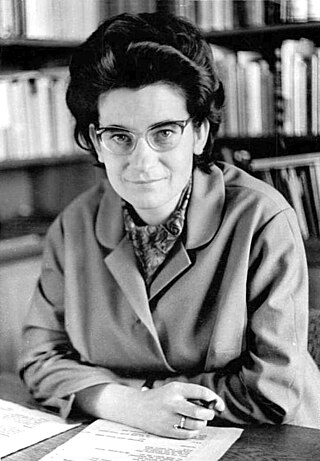
Christa Wolf was a German novelist and essayist. She is considered one of the most important writers to emerge from the former East Germany.

Martin Johannes Walser was a German writer, especially known as a novelist. He began his career as journalist for Süddeutscher Rundfunk, where he wrote and directed audio plays. He was part of Group 47 from 1953.

Katja Lange-Müller is a German writer living in Berlin. Her works include several short stories and novellas, radio dramas, and dramatic works.

Manfred Krug was a German actor, singer and author.
Barbara Honigmann is a German author, artist and theater director.

Herta Müller is a Romanian-German novelist, poet, essayist and recipient of the 2009 Nobel Prize in Literature. She was born in Nițchidorf, Timiș County in Romania; her native language is German. Since the early 1990s, she has been internationally established, and her works have been translated into more than twenty languages.
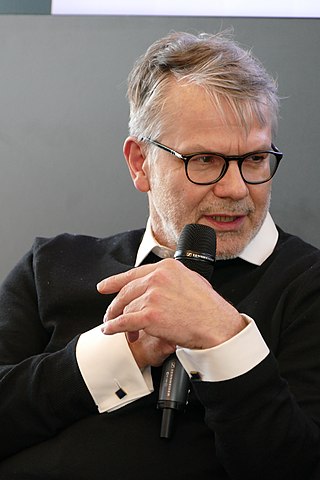
Durs Grünbein is a German poet and essayist.
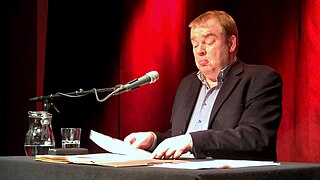
Max Goldt is a German writer, columnist and musician.
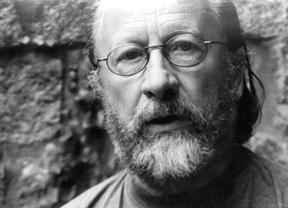
Georg Katzer was a German composer and teacher. The last master student of Hanns Eisler, he composed music in many genres, including works for the stage. Katzer was one of the pioneers of electronic new music in the German Democratic Republic and the founder of the first electronic-music studio in the GDR. He held leading positions in music organisations, first in the East, then in the united Germany, and received many awards, including the Art Prize of the German Democratic Republic, the National Prize of the German Democratic Republic, the Order of Merit of the Federal Republic of Germany, and the German Music Authors' Prize.

Friederike Mayröcker was an Austrian writer of poetry and prose, audio plays, children's books and dramatic texts. She experimented with language, and was regarded as an avantgarde poet, and as one of the leading authors in German. Her work, inspired by art, music, literature and everyday life, appeared as "novel and also dense text formations, often described as 'magical'." According to The New York Times, her work was "formally inventive, much of it exploiting the imaginative potential of language to capture the minutiae of daily life, the natural world, love and grief".

Christoph Hein is a German author and translator. He grew up in the village Bad Düben near Leipzig. Being a clergyman's son and thus not allowed to attend the Erweiterte Oberschule in the GDR, he received secondary education at a gymnasium in the western part of Berlin. After his Abitur he jobbed inter alia as assembler, bookseller and assistant director. From 1967 to 1971 Hein studied philosophy in Leipzig and Berlin. Upon graduation he became dramatic adviser at the Volksbühne in Berlin, where he worked as a resident writer from 1974. Since 1979 Hein has worked as a freelance writer.
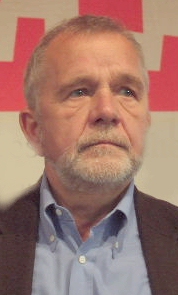
Rüdiger Safranski is a German philosopher and author.

Daniela Dahn is a German writer, journalist and essayist. Since the reunification of Germany in 1990, Dahn has been an outspoken critic of the reunification process. Her highly personal style of writing, and her strident political opinions, have stirred controversy within Germany, but Dahn, who considered herself a dissident within East Germany before 1989, advocates for a critical journalism that continues the democratic tradition of challenging the government and policies of reunified Germany.

Lutz Rathenow is a dissident German writer and poet who was haunted by the Secret Police until the German reunification. From then on, his fortunes changed, and he received several literary honors and awards.

Elfriede Brüning was a German communist journalist and novelist. She also used the pseudonym Elke Klent.

Rita Kuczynski is a German author, philosopher and editorialist.
Katrin Hattenhauer is a German painter and civil rights activist. In the late 1980s she was a member of the GDR-opposition movement. On 4 September 1989 she demonstrated "For an Open Country with Free People", marking the beginning of the Monday demonstrations in Leipzig. Her paintings and social sculptures have been exhibited in Europe.

Vera Friedländer was a German writer and Holocaust survivor.
Monika Rinck is a German writer.
Irina Liebmann is a German journalist-author and sinologist of Russo-German provenance. She has won a number of important literary prizes: the most significant of these, probably, was the 2008 Leipzig Book Fair non-fiction Prize, awarded for "Wäre es schön? Es wäre schön!", a biography of her father, a noted anti-Nazi activist and political exile in Warsaw and Moscow who, after 1945, returned to what became, in 1949, the German Democratic Republic and in 1953, despite his longstanding record of communist activism, emerged as an uncompromising critic of the East German leader Walter Ulbricht: he was expelled from the party and suffered various other government mandated public indignities. She grew up and lived the first part of her adult life in the German Democratic Republic, but succeeded in moving to West Berlin during 1988, thereby anticipating reunification by more than a year.